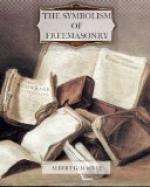It must be evident, from all that has been said respecting the analogy in origin and design between the masonic and the ancient religious myths, that no one acquainted with the true science of this subject can, for a moment, contend that all the legends and traditions of the order are, to the very letter, historical facts. All that can be claimed for them is, that in some there is simply a substratum of history, the edifice constructed on this foundation being purely inventive, to serve us a medium for inculcating some religious truth; in others, nothing more than an idea to which the legend or myth is indebted for its existence, and of which it is, as a symbol, the exponent; and in others, again, a great deal of truthful narrative, more or less intermixed with fiction, but the historical always predominating.
Thus there is a legend, contained in some of our old records, which states that Euclid was a distinguished Mason, and that he introduced Masonry among the Egyptians.[149] Now, it is not at all necessary to the orthodoxy of a Mason’s creed that he should literally believe that Euclid, the great geometrician, was really a Freemason, and that the ancient Egyptians were indebted to him for the establishment of the institution among them. Indeed, the palpable anachronism in the legend which makes Euclid the contemporary of Abraham necessarily prohibits any such belief, and shows that the whole story is a sheer invention. The intelligent Mason, however, will not wholly reject the legend, as ridiculous or absurd; but, with a due sense of the nature and design of our system of symbolism, will rather accept it as what, in the classification laid down on a preceding page, would be called “a philosophical myth”—an ingenious method of conveying, symbolically, a masonic truth.
Euclid is here very appropriately used as a type of geometry, that science of which he was so eminent a teacher, and the myth or legend then symbolizes the fact that there was in Egypt a close connection between that science and the great moral and religious system, which was among the Egyptians, as well as other ancient nations, what Freemasonry is in the present day—a secret institution, established for the inculcation of the same principles, and inculcating them in the same symbolic manner. So interpreted, this legend corresponds to all the developments of Egyptian history, which teach us how close a connection existed in that country between the religious and scientific systems. Thus Kenrick tells us, that “when we read of foreigners [in Egypt] being obliged to submit to painful and tedious ceremonies of initiation, it was not that they might learn the secret meaning of the rites of Osiris or Isis, but that they might partake of the knowledge of astronomy, physic, geometry, and theology.” [150]




